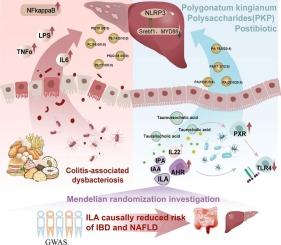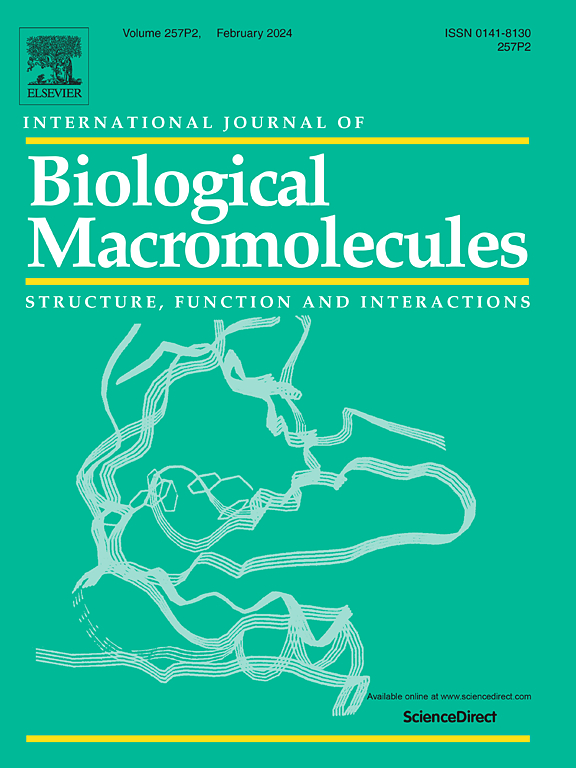金黄精多糖培养的罗伊氏乳酸杆菌改善高脂高糖恶化的结肠炎和相关的肝胆疾病
IF 8.5
1区 化学
Q1 BIOCHEMISTRY & MOLECULAR BIOLOGY
International Journal of Biological Macromolecules
Pub Date : 2025-08-22
DOI:10.1016/j.ijbiomac.2025.147065
引用次数: 0
摘要
不健康的饮食会加剧炎症性肠病及其相关的肝破坏。本研究表明,与黄精多糖(PKP后生物)一起培养的热灭活罗伊氏乳杆菌WX-94 (L. reuteri)在改善大鼠高脂高糖(HFHS)恶化的结肠炎方面具有优越的功效,其效果优于PKP(其共生形式)和不加PKP培养的灭活罗伊氏乳杆菌。在给药DSS后,HFHS使大鼠的肝功能恶化,而PKP可以逆转这种情况。PKP后生物只富集普雷沃氏菌和乳酸杆菌,减少埃希氏菌。随着粪便短链脂肪酸、血清胆汁酸(如牛磺胆酸、牛磺酰胆酸和牛磺酰胆酸)、吲哚衍生物(如吲哚丙酸、吲哚乙酸、吲哚乳酸)和磷脂的升高。机制上,PKP通过调节色氨酸分解代谢激活的AHR/IL-22信号和胆酸激活的TLR4/NFκB/NLRP3信号来抑制结肠炎症和肝胆疾病。此外,我们利用来自基因表达综合数据库的人类数据来证实PKP后生物调控的关键途径参与结肠炎的发病机制。在PKP生物后升高的吲哚乳酸与结肠炎和非酒精性脂肪肝疾病之间观察到孟德尔随机衍生的因果关系。我们的研究提供了令人信服的证据,证明PKP的新特性增加了灭活罗伊氏乳杆菌的健康促进益处。本文章由计算机程序翻译,如有差异,请以英文原文为准。

Postbiotic Limosilactobacillus reuteri cultured with Polygonatum kingianum polysaccharides ameliorates high-fat-high-sugar-deteriorated colitis and associated hepatobiliary disorders
Unhealthy diet exacerbates inflammatory bowel disease and its associated hepatic disruptions. The present study demonstrated the superior efficacy of the heat-inactivated Limosilactobacillus reuteri WX-94 (L. reuteri), cultured with Polygonatum kingianum polysaccharides (PKP postbiotic) in ameliorating a high-fat-high-sugar (HFHS)- deteriorated colitis in rats, which outperforming PKP alone, its symbiotic form, and inactivated L. reuteri cultured without PKP. HFHS deteriorated liver functions in rats following a DSS administration, which were reversed by PKP postbiotic. PKP postbiotic exclusively enriched Prevotella and Lactobacillus while decreasing Escherichia.coil, along with the elevation in fecal short-chain fatty acids, serum bile acids (e.g., taurocholic acid, taurallocholic acid and tauroursocholic acid), indole derivatives (e.g., indolepropionic acid, indoleacetic acid, indolelactic acid) and phospholipids. Mechanistically, PKP postbiotic suppressed colonic inflammation and hepatobiliary disorders through regulating tryptophan catabolism-activated AHR/IL-22 signaling and bile acids-activated TLR4/NFκB/NLRP3 signaling. Furthermore, we utilized human data sourced from Gene Expression Omnibus databases to confirm the involvement of key pathways regulated by PKP postbiotic in the colitis pathogenesis. Mendelian randomization-derived causal associations were observed between PKP postbiotic-elevated indole lactic acid with both colitis and nonalcoholic fatty liver disease. Our study presents compelling evidence of a novel property of PKP that augments the health-promoting benefits of inactivated L. reuteri.
求助全文
通过发布文献求助,成功后即可免费获取论文全文。
去求助
来源期刊
CiteScore
13.70
自引率
9.80%
发文量
2728
审稿时长
64 days
期刊介绍:
The International Journal of Biological Macromolecules is a well-established international journal dedicated to research on the chemical and biological aspects of natural macromolecules. Focusing on proteins, macromolecular carbohydrates, glycoproteins, proteoglycans, lignins, biological poly-acids, and nucleic acids, the journal presents the latest findings in molecular structure, properties, biological activities, interactions, modifications, and functional properties. Papers must offer new and novel insights, encompassing related model systems, structural conformational studies, theoretical developments, and analytical techniques. Each paper is required to primarily focus on at least one named biological macromolecule, reflected in the title, abstract, and text.

 求助内容:
求助内容: 应助结果提醒方式:
应助结果提醒方式:


